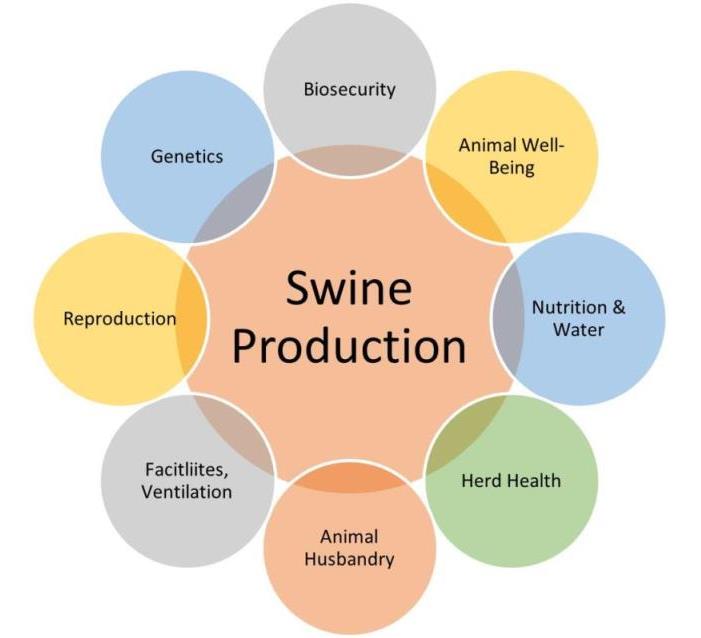

Most commonly, when the word holistic is used within the swine industry, authors are referring to the use of non-antibiotic methods in raising pigs. Today, I’d like to introduce the term “holistic” as a bird’s-eye view approach.


The definition of holistic is “characterized by the belief that the parts of something are interconnected and can be explained only by reference to the whole.” When applying this term to pig production, think of all the moving parts involved in raising a pig (for example, biosecurity, animal health, nutrition, water, ventilation, etc.) and how each of these is connected to the others in a web. How does feed impact animal health? Does biosecurity impact pig survivability? Connecting each of these factors and understanding areas of improvement will help increase the productivity and profitability of your swine operation.
Figure 1: Management factors to consider for raising pigs holistically.
- Biosecurity
- Animal well-being
- Nutrition and water
- Herd health
- Animal husbandry
- Facilities and ventilation
- Reproduction
- Genetics


At Hubbard, our research facilities provide a unique opportunity to run commercial-sized trials with multiple replicates per treatment to find the smallest changes in health and growth parameters. This has enabled us to create holistic nutrition programs that consider the factors listed above.
What would a holistic approach to research and product development look like?
A truly holistic approach should meet the nutrition needs of pigs, decrease gut problems, improve animal well-being, reduce mortality and improve biosecurity and production. There should also be added benefits of increased time for workers to take care of pigs and improved worker morale. Over the past several years, our swine research and nutrition team has conducted numerous research trials looking at providing producers with a simpler and more practical feeding program to meet the holistic goals of nursery pigs. This research helped solidify the foundation for a single-phase program for pigs weighing 13–25 pounds called Powerstart™ Solo.
The Powerstart Solo program provides an opportunity to reallocate time from managing feed budgets, bins and orders to time spent with pigs. Feed is only delivered once for the first 21 days, eliminating errors associated with budgeting, simplifying deliveries and reducing trips to the farm with a feed truck, thus improving biosecurity. Regarding performance, producers on the Powerstart Solo program see fewer scours and lagging pigs due to removing one or two diet transition points. The biggest advantage has been the improvement seen in the bottom 5–10% of pigs, not only in mortality but with more marketable animals. A single-phase diet allows small pigs to thrive because they are getting more of a product geared toward their success than in a traditional, two-phase nursery program. The result has been improved gains and uniformity throughout the nursery. Powerstart Solo truly is a holistic program.
Holistic feed safety
Let’s look at another example. Because of porcine epidemic diarrhea (PED) and African swine fever (ASF) concerns, feed safety is front-of-mind for many producers. However, due to the rise in feedstuff variation and potential risks associated with the feeds, one of the major risks is mycotoxins, which are produced by molds coming from the field or growing in storage. Ingredients contaminated with mycotoxins can be a serious risk for pig producers. The concentrations and types of mycotoxins in the feed, as well as the stage of production of the pig, can affect the extent to which the animal is impacted. Even at reduced levels, mycotoxin contamination can impair livestock performance, reduce feed intake, cause intestinal damage, increase mortality and disrupt reproduction.
Additionally, mycotoxin infection reduces the effectiveness of the immune system, which may escalate the potential for further disease challenges. Dietary prevention efforts to better control mycotoxin risk provide producers peace of mind and benefit the health, welfare and reproduction of the animals. While strategies to blend good grains or use alternative ingredients are effective, they are often unavailable to pork producers. The Alltech 37+® mycotoxin analysis program (www.knowmycotoxins.com) is a valuable tool for detecting mycotoxins. Results from the 37+ program provide a realistic picture of contaminants in feed ingredients or finished feeds in the form of a detailed report of the mycotoxin levels and suggest solutions for mitigating the mycotoxins of concern.
The above examples emphasize how Hubbard is focused on providing holistic products and solutions that can help improve your swine operation. We don’t just focus on individual issues to assist producers with feeding pigs. Instead, we look at each farm as a whole to provide unique solutions to improve the overall health and well-being of the pigs. We understand that a single factor like mycotoxins or poor gut health can be linked to downstream outcomes that can change the trajectory of health and growth of the pigs. Our research on health-challenged pigs is creating new insights on nutrition programs for pigs that have faced disease challenges and what type of performance those pigs will have after they recover from the health challenge.
The Hubbard swine team works to create solutions that not only provide our customers with products that solve their everyday problems but ones that will improve their profitability and competitive edge, reduce risks and make their lives easier. Solutions to a problem demand a holistic approach and a strategic vision of what can be achieved. Hubbard has various tools and strategies to help solve your swine-related concerns. Contact your Hubbard Feeds representative if you are interested in a more detailed evaluation of our holistic farm approach.





